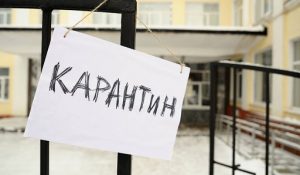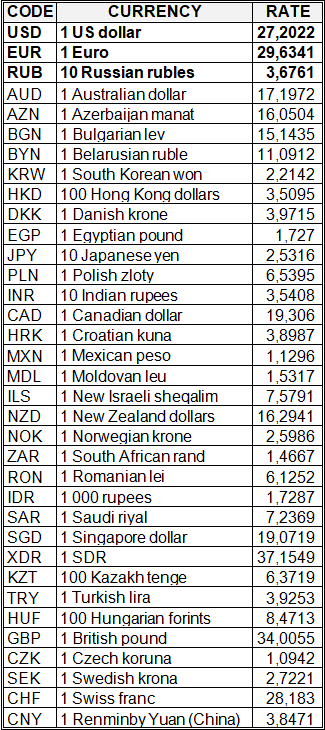
Ukrainian pharmaceutical company Microkhim (Rubizhne, Luhansk region) is ready to start production of a generic antiviral drug to combat the coronavirus disease (COVID-19) by the end of the year, Microkhim Director General Ihor Pohromsky has said in an interview with the Uriadovy Kurier government’s newspaper. “Now the key point is that we are transporting the substance. In the near future we will expose it to comprehensive analytical control, develop a dosage form and establish and conduct bioequivalence clinical trials. There is a lot of work ahead. There is a lot of professional work that we can do, but it has terms and limitations. However, the situation is such that, despite quarantine, we are ready to work to provide the country with a domestic drug this year, and I am sure that we will be first among national manufacturers, who will develop it,” he said, adding that it comes to the production of generic Avigan.
According to Pohromsky, “the drug was developed in Japan against several influenza viruses in 2014, and in 2015 it passed the third phase of clinical trials in the United States. It happened so that it was tested during an epidemic in Wuhan, and later allowed for experimental use in Italy against COVID-19. By the way, it has already become known that more than 30 countries have asked Japan to provide them with this drug for combating COVID-19. Japan has provided it to Ukraine to continue clinical trials involving patients with COVID-19.”
The general director said that the price of the generic drug made in Ukraine will be much lower than the price of the original. In addition, in the context of global hype, it is difficult to talk about the wholesale supply of original drugs to Ukraine. Therefore, according to Pohromsky, it is necessary to start domestic production.

The Board of Directors of Myronivsky Hliboproduct agricultural holding on April 13, 2020 approved the distribution of interim dividend for 2019 in the amount of $0.2803 per share with total amount of the interim dividend being $30 million.
According to a company report on the London Stock Exchange (LSE), the dividend will be paid to the company’s shareholders on April 28, 2020.
As reported, in 2019, MHP paid $80 million of the dividend to its shareholders ($0.7474 per share).
MHP is the largest producer of poultry in Ukraine. It is also engaged in production of cereals, sunflower oil and meat.

PJSC Interpipe Nyzhniodniprovsky Pipe Rolling Plant (Dnipro) has built and commissioned a new warehouse at the export site of the company’s wheel-rolling shop, investing $271,000 in the project.
According to the quarterly report of the company, at the beginning of 2020, Interpipe plant provided itself with an additional warehouse for finished products, and a collection point was established for packing additional volumes of wheels in pallets.
“The new storage was organized to reduce the cost of packaging for sending railway wheels for export,” it said.
In addition, the company began using wooden pallets instead of metal cassettes for products that are shipped to Europe by truck, transported by road.
The report also states that in March steel indices in the global markets declined due to a sharp drop in demand. At the same time, the cost of scrap metal HMS 80/20 CFR Turkey fell by $20.7/tonne, or 7.6% compared to the previous month, the cost of square billets FOB Black Sea by $18.1/tonne or 4.7%.
“Most of the traditional trade outlets for steel billets of CIS production were inactive due to blocking and restrictive measures introduced by the governments during the pandemic. The demand was seen mainly in China,” the report said.
The Ukrainian market has also suffered due to protective measures in the fight against coronavirus, in particular, the hryvnia has depreciated by 14.3% since the beginning of March, construction volumes were down. The output of railway wagons also decreased.
EXPORT, INTERPIPE, PLANT, RAILWAY PRODUCTS, SHIPMENT, WAREHOUSE

The number of unemployed in Ukraine in the first two weeks of quarantine increased by 500,000-700,000 people, over the next two weeks, in April, by another 500,000-600,000 people, to 2.5-2.8 million people, the Ukrainian Chamber of Commerce and Industry (UCCI) has said.
“According to the estimates of the Ukrainian Chamber of Commerce and Industry, the unemployment rate today is 13.7-15.4%. This is the highest rate in the last 15 years,” the press service said citing president of the chamber Hennadiy Chizhikov.
This figure does not take into account the number of labor migrants who returned to Ukraine after the start of pandemic, he added.
About 4 million people were employed in the “stopped” industries, he said.
“A survey of companies conducted by the Chamber of Commerce and Industry shows that 26% of them plan to reduce staff, another 30% have not made a final decision,” the expert said.
According to the agency, the total amount of support for businesses through tax exemption in March and April stood at UAH 9.3 billion, of which UAH 900 million was support for small businesses, which suffered the largest losses during quarantine.
“The estimated losses of only two sectors – beauty salons and passenger transportation – amount to about UAH 1.5 billion over a month and a half of quarantine. Losses of the entire businesses “in quarantine” are many times more,” he added.
As reported, according to the State Employment Service, on April 13 the number of registered unemployed amounted to 387,500 people, over the week this figure increased by 36,200 people.
National bank of Ukraine’s official rates as of 17/04/20

Source: National Bank of Ukraine